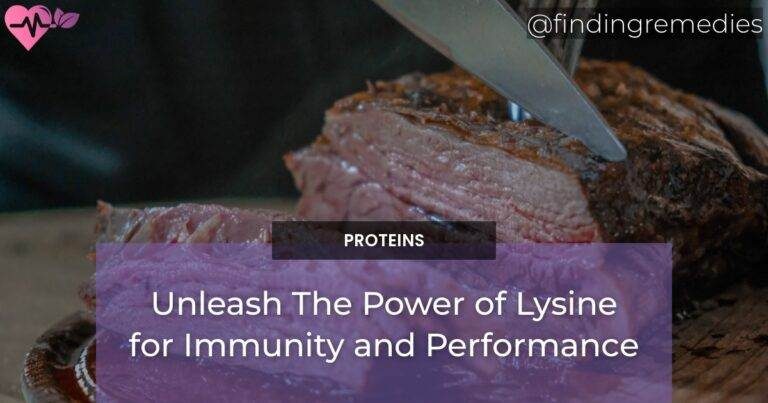Lysine is an essential amino acid that plays a crucial role in maintaining optimal health and performance. This powerful nutrient is involved in various physiological processes, including protein synthesis, collagen formation, and immune function. In this comprehensive article, we will explore the many benefits of lysine and its essential role in supporting immunity and enhancing athletic performance. We will also delve into the recommended dosage, dietary sources, and even its potential in preventing and treating cold sores. By understanding the power of lysine and incorporating it into our daily lives, we can unlock its full potential for improved health and well-being.
What is Lysine?
Definition of Lysine
Lysine is an essential amino acid, meaning it cannot be synthesized by the body and must be obtained through diet or supplements. It is one of the building blocks of proteins and is necessary for various physiological functions.
Structure and Properties of Lysine
Lysine has a unique structure, with a side chain containing four carbon atoms. This structure gives lysine its unique properties and allows it to participate in important biochemical reactions within the body.
Why Lysine is Essential?
ALSO READ
Importance of Essential Amino Acids
Essential amino acids are vital for human health as they cannot be synthesized by the body and must be obtained through the diet. These amino acids play a crucial role in various physiological processes and are the building blocks of proteins.
Role of Lysine as an Essential Amino Acid
Lysine is an essential amino acid that serves as a precursor for the synthesis of proteins and plays a vital role in numerous physiological functions. It is involved in protein synthesis, collagen formation, calcium absorption, and enzyme production.
Lysine Roles in the Body
Protein Synthesis and Tissue Growth
Lysine is a key player in protein synthesis, which is essential for tissue growth, repair, and maintenance. It helps build and repair muscles, connective tissues, and organs, supporting overall growth and development.
Collagen Formation and Wound Healing
Lysine is crucial for the formation of collagen, a major component of connective tissues, skin, and blood vessels. It promotes wound healing, skin elasticity, and the overall health of the skin.
Calcium Absorption and Bone Health
Lysine aids in the absorption and utilization of calcium, an essential mineral for bone health and strength. It helps maintain proper bone density and can contribute to the prevention of osteoporosis.
Enzyme and Hormone Production
Lysine is involved in the production of enzymes and hormones, including growth hormone and insulin. These substances play crucial roles in regulating various physiological processes, such as metabolism and cell growth.
Lysine Benefits
Immune System Support
Lysine plays a vital role in supporting the immune system. It helps produce antibodies, which are essential for fighting off infections and diseases. Lysine also enhances the activity of immune cells, making it an important nutrient for overall immune function.
Athletic Performance Enhancement
Athletes and active individuals can benefit from lysine supplementation to enhance their performance. Lysine is involved in energy metabolism, muscle recovery, and the synthesis of carnitine, a compound that aids in fat burning and energy production.
Cold Sore Prevention and Treatment
Lysine has been found to be effective in preventing and treating cold sores, which are caused by the herpes simplex virus. It works by inhibiting the replication of the virus and reducing the duration and severity of cold sore outbreaks.
Lysine Food Sources
Animal-Based Sources
Lysine is abundant in various animal-based foods, including meat, poultry, fish, dairy products, and eggs. These sources provide a complete protein profile and can be easily incorporated into a balanced diet.
Plant-Based Sources
While plant-based sources may not contain as much lysine as animal-based sources, several plant foods can still contribute to lysine intake. Legumes, such as beans, lentils, and peas, are particularly rich in lysine. Other plant-based sources include quinoa, soy products, and nuts.
Lysine Dosage Recommendations
Recommended Daily Allowance (RDA)
The recommended daily allowance for lysine varies depending on age, sex, and specific health conditions. For adults, the RDA ranges from 38 mg/kg to 51 mg/kg of body weight. It is important to consult with a healthcare professional to determine the appropriate dosage for individual needs.
Supplement Dosage Guidelines
Lysine supplements are available in various forms, including capsules, tablets, and powders. The dosage typically ranges from 500 mg to 3000 mg per day. It is essential to follow the instructions provided by the manufacturer or consult a healthcare professional for personalized dosage recommendations.
Can Lysine and Arginine Be Used Together for Immunity and Performance?
Lysine and arginine are versatile nonessential amino acids that can be used together to support immunity and performance. Lysine aids in the production of antibodies, while arginine promotes circulation and helps with muscle recovery. Together, they can enhance overall health and physical capabilities.
Conclusion
Lysine is a powerful essential amino acid that offers a wide range of health benefits. From supporting immune function to enhancing athletic performance and promoting wound healing, lysine plays a crucial role in maintaining optimal health and well-being. By incorporating lysine-rich foods into our diet or considering supplementation, we can harness the power of lysine and unlock its potential for improved immunity and performance.

